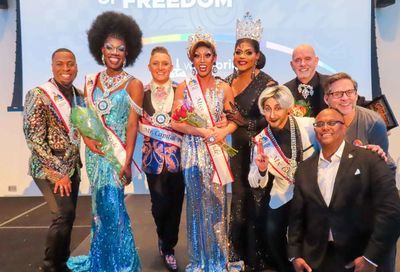DC Department of Corrections policy on transgender prisoner housing is still discriminatory, says ACLU
New policy requires trans prisoners to be placed in solitary confinement as they await their regular housing assignment.

The ACLU of the District of Columbia, along with the Public Defender Service for the District of Columbia, is alleging that the D.C. Department of Corrections’ policy on housing transgender inmates remains discriminatory because it forces transgender individuals into solitary confinement — which can be emotionally and mentally damaging.
The organizations first became concerned with DOC’s policy on housing inmates after their client, Sunday Hinton, a trans female, was placed in a men’s unit in the D.C. Jail because of her genitalia, despite having socially transitioned and having her gender identified as female in Superior Court documents.
Hinton sued, arguing that the policy was discriminatory and violated her constitutional rights, as well as prohibitions on discrimination based on a person’s gender identity contained in the DC Human Rights Act and federal regulations under the Prison Rape Elimination Act.
She also demanded that she be transferred to a women’s housing unit and that the department change its policy of housing transgender individuals based solely on their genitalia.
Under DOC’s previous policy, inmates were housed based on their anatomy, unless they were able to obtain a recommendation for alternative housing from DOC’s Transgender Housing Committee, which is comprised of DOC staffers, a doctor, a social worker, a mental health clinician, and members of the local transgender community.
Absent a recommendation from the committee, prisoners were either forced to housed based on their genitalia, or, if they refused, in “protective custody,” also known as solitary confinement. And even if they obtained a recommendation from the committee, the final decision was left in the hands of the warden.
However, Hinton previously alleged in her lawsuit that even members of the Transgender Housing Committee places emphasis on criteria that are intended to keep inmates in housing based on their assigned sex at birth, such as whether a person has had “full [gender] reassignment surgery’ and whether the individual has ever been in a “heterosexual relationship.”
In that lawsuit, Hinton also challenged the provision putting inmates who did not wish to be housed based on their assigned sex at birth in protective custody, arguing that solitary confinement-by-another-name negatively impacts transgender prisoners’ mental health by intensifying their feelings of isolation and anxiety, and potentially causing problems with concentration, memory, and ability to perform simple, repetitive tasks due to the lack of external stimuli.
It also places trans inmates at higher risk of suicide, Hinton argued, noting that more than half of inmate suicides involve prisoners who have been held in solitary confinement, even though such prisoners only comprise 3% to 6% of the total prisoner population.
A few days after the lawsuit was filed, DOC moved Hinton to a women’s unit.
See also: Justice Department issues statement of interest in transgender prisoners’ sexual assault lawsuit
Last month, DOC issued a new policy, stating that transgender prisoners will be held in protective custody, in a unit consistent with their gender preference, upon intake. But the ACLU of DC and the Public Defender Service say the policy is still discriminatory, because it forces all trans individuals into solitary confinement until they receive their regular housing assignment, a process that could potentially take up to a week or more.
Opponents of the policy also note that it does not eliminate the problems with the old anatomy-based policy. While the new policy purports to take account of individuals’ preferences through individualized hearings, the ACLU-DC and Public Defender Service have identified three additional trans prisoners who have not received hearings and were not reassigned to gender-affirming housing even after the new policy was issued.
As a result, they are continuing to fight the DOC over its housing assignment policy and are seeking certification as a class-action lawsuit, so that others do not experience the same discrimination as Hinton.
“The District cannot comply with the Constitution by replacing one form of discrimination with another,” Scott Michelman, the legal director of the ACLU of DC, said in a statement. “Subjecting transgender individuals to what is effectively solitary confinement just because they are transgender is cruel, inhumane, and blatantly discriminatory.”
See also:
HIV vaccine trial launched, 40 years after virus first detected
Senate confirms Shawn Skelly and Gina Ortiz Jones to top military posts in historic firsts
Federal judge blocks West Virginia’s transgender athlete ban from taking effect
Support Metro Weekly’s Journalism
These are challenging times for news organizations. And yet it’s crucial we stay active and provide vital resources and information to both our local readers and the world. So won’t you please take a moment and consider supporting Metro Weekly with a membership? For as little as $5 a month, you can help ensure Metro Weekly magazine and MetroWeekly.com remain free, viable resources as we provide the best, most diverse, culturally-resonant LGBTQ coverage in both the D.C. region and around the world. Memberships come with exclusive perks and discounts, your own personal digital delivery of each week’s magazine (and an archive), access to our Member's Lounge when it launches this fall, and exclusive members-only items like Metro Weekly Membership Mugs and Tote Bags! Check out all our membership levels here and please join us today!























You must be logged in to post a comment.